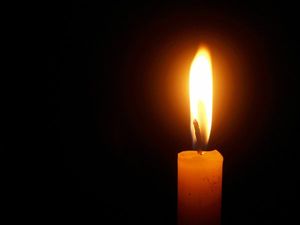The dark days are here
Each autumn, here in the UK, we gain an extra hour in bed when the clock is turned back from British Summer Time to Greenwich Mean Time. Whilst the extra hour of rest is very welcome, this season of the year is not the favourite of many.
The evenings now get darker earlier, and, before we know it, winter has arrived. It’s easier to be cheerful when it is bright and sunny than when it is dark and dreary.
There is a recognised medical condition called SAD — Seasonally Affected Disorder. Our moods can take a plunge when the dark weather comes. SAD is treated using artificial lamps which simulate daylight.
Creation
Whilst we all prefer the midday sun to the black of night, according to the Bible darkness is part of God’s created order. The night which we sometimes dread is actually divinely sent.
‘While the earth remains, seedtime and harvest, cold and heat, summer and winter, day and night, shall not cease’ (Genesis 9:22); ‘thou makest darkness, and it is night’ (Psalm 104:20); ‘I am the Lord … I form light and create darkness’ (Isaiah 45:7).
What, though, of the more subtle, personal darkness which Christians experience? What of those times and seasons in our lives when we can’t understand God’s providential dealings with us and feel very much as though a heavy darkness has descended upon us?
Christians lose their jobs. Christians get knocked down by cars. Christians are not immune from disability and terminal illness. Christian couples can desire children and yet suffer the pain of infertility or miscarriage.
Christians suffer from broken relationships. We all experience pain, perplexity, disappointments and various losses and crosses from time to time.
It is good to remember that personal darkness is as equally from God as is the natural darkness.
Providence
He is the God of creation and providence; hence, darkness must be part of his good, acceptable and perfect will for our lives.
‘I form light and create darkness; I make weal and create woe. I am the Lord, who do all these things’ (Isaiah 45:7); ‘this God, his way is perfect’ (Psalm 18:30); ‘we know that in everything God works for good with those who love him’ (Romans 8:28).
Accepting that the darkness in our lives as not accidental but divinely sent from the hand of a loving heavenly Father, surely makes it easier to bear and wait for the light of morning to come. ‘The Lord my God lightens my darkness’ (Psalm 18:28).
Our spiritual forefathers were possibly more expert than we are concerning God’s dark providences. The modern church, on the whole, has far more time for the bright threads than the dark threads of the pattern God is weaving in, through and for our lives.
The Westminster Confession of Faith, though, is both scriptural and realistic when it states: ‘The most wise, righteous and gracious God, doth often times leave for a season his own children to manifold temptations and the corruptions of their own hearts, to chastise them for their former sins, or to discover unto them the hidden corruption and deceitfulness of their own hearts, that they may be humbled;
‘And to raise them to a more close and constant dependence for their support upon himself, and to make them more watchful against all future occasions of sin, and for sundry other just and holy ends’ (‘Of providence’).
Trust
God’s own adopted children then — the ‘children of light’ (Ephesians 5:8) — may expect to experience dark seasons.
Does the Bible offer any help and solace to us here? Yes it does. Psalm 139:12 tells us that, with God, ‘even the darkness is not dark to thee; the night is bright as the day, for darkness is as light with thee’. Daniel 2:22 tells us that, ‘He knows what is in the darkness’.
When we don’t understand God’s ways with us then — when we are in the dark — we may be reassured that he understands his own ways.
When we don’t know why certain events come into our lives — the ‘good’ which is seemingly denied us and the ‘bad’ which comes as an unwelcome, unwanted guest — we may be reassured that our all-loving, all-knowing God knows why.
Darkness is as light with him. The crooked is perfectly straight with him, and one day he will make all his ways with us plain. ‘For now we see in a mirror dimly, but then face to face. Now I know in part; then I shall understand fully, even as I have been fully understood’ (1 Corinthians 13:12).
Winter grace
Our spiritual ancestors were adamant that ‘grace grows in winter’. They were surely right. If God only sent bright providences to us — good health, wealth, success, tension-free work and family life — would we not be in danger of forgetting how totally dependent we are on him for all things?
Does he not then send us darkness to increase our faith in him? We cannot see in the dark, but he can. ‘We walk by faith, not by sight’ (2 Corinthians 5:7).
Divinely sent darkness then is actually an adoptive blessing. Our Father in heaven is taking a personal interest in us and our well-being. He has chosen to nurture his children and aid our spiritual growth by this means: ‘… who walks in darkness and has no light, yet trusts in the name of the Lord and relies upon his God…’ (Isaiah 50:10).
And the good news of the gospel is that the Christian’s present darkness is not permanent. A better, brighter day is as sure as the promise of God.
The Bible describes hell as ‘the outer darkness’. There men will weep and gnash their teeth’ (Matthew 8:12), whereas in the city of the New Jerusalem — the eternal home of the redeemed — ‘night shall be no more … for the Lord God will be their light’ (Revelation 22:5).
Whilst the times of darkness that the Christian experiences in this world are real, it is a paradox that Christians are and shall yet be the ‘children of light’.
‘He has delivered us from the dominion of darkness and transferred us to the kingdom of his beloved Son’ (Colossians 1:13).
Atonement
Hell — the ultimate in God’s judgement on sin and sinners — is indeed outer darkness. On the cross of Calvary though, the Lord Jesus, God’s own Son, took God’s judgement for our sins on himself.
When he did so, the Bible records that ‘from the sixth hour there was darkness over all the land until the ninth hour. And about the ninth hour Jesus cried with a loud voice, Eli, Eli, lama sabachthani? That is, my God, my God, why hast thou forsaken me?’ (Matthew 27:45-46).
He suffered the darkness of divine judgement for our divine justification. He suffered alienation from the Father for the believer’s eternal reconciliation to him.
He took the dark hell which was our just due, so that by believing in him we might go at last to heaven and bask in God’s eternal light.
Believers, then, may expect times of darkness in this world. Yet, on the authority of the Bible, we may state that believers will never experience the eternal darkness of hell.
Why? Because our faith is in the Christ of Calvary — the one who alone could make the incomparable claim: ‘I am the light of the world. He who follows me will not walk in darkness, but will have the light of life’ (John 8:12).
I heard the voice of Jesus say
I am this dark world’s light,
Look unto me, thy morn shall rise
And all thy days be bright!
I looked to Jesus, and I found
In him my star my sun,
And in that light of life I’ll walk
Till travelling days are done.
Timothy Cross



















